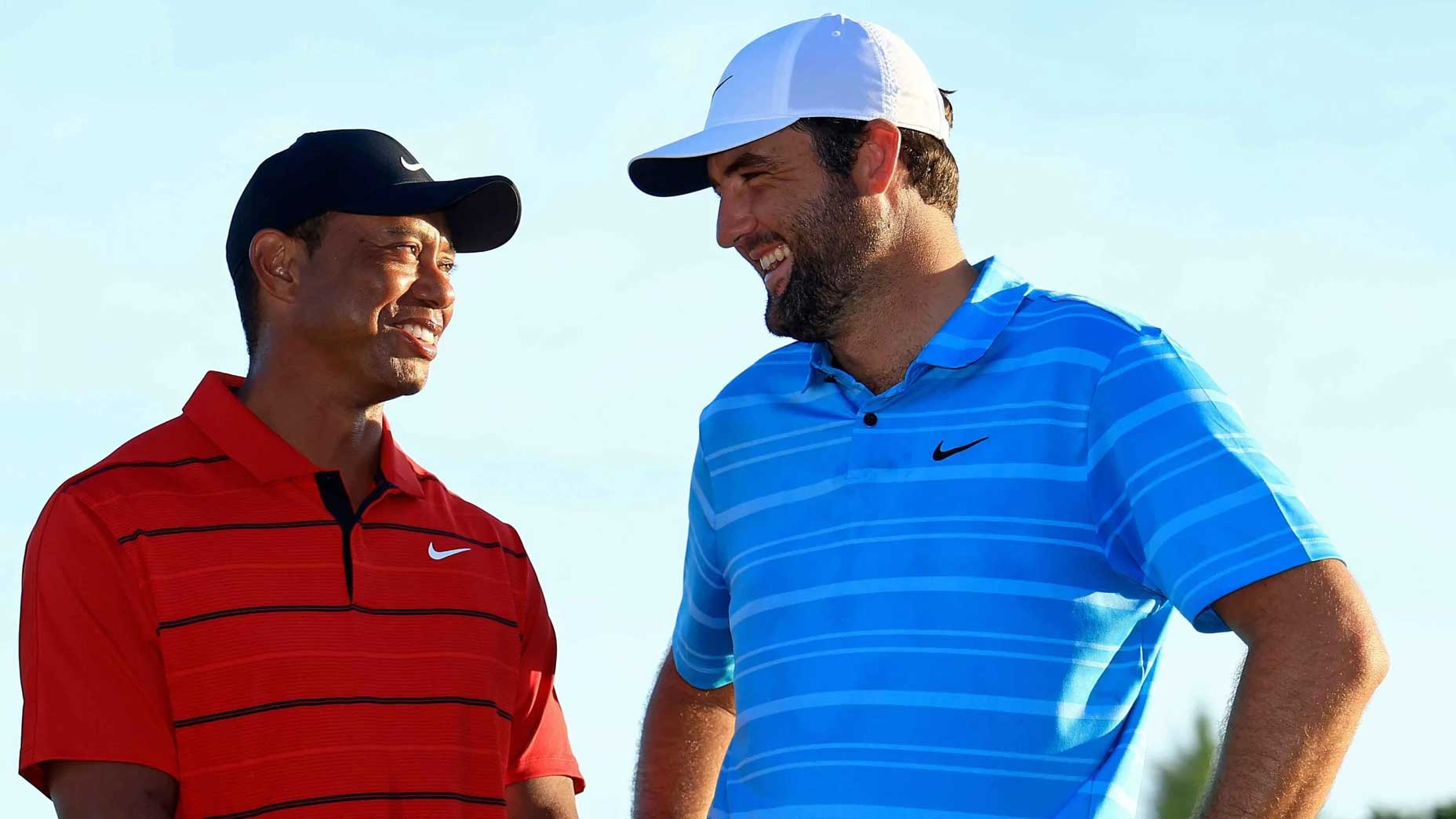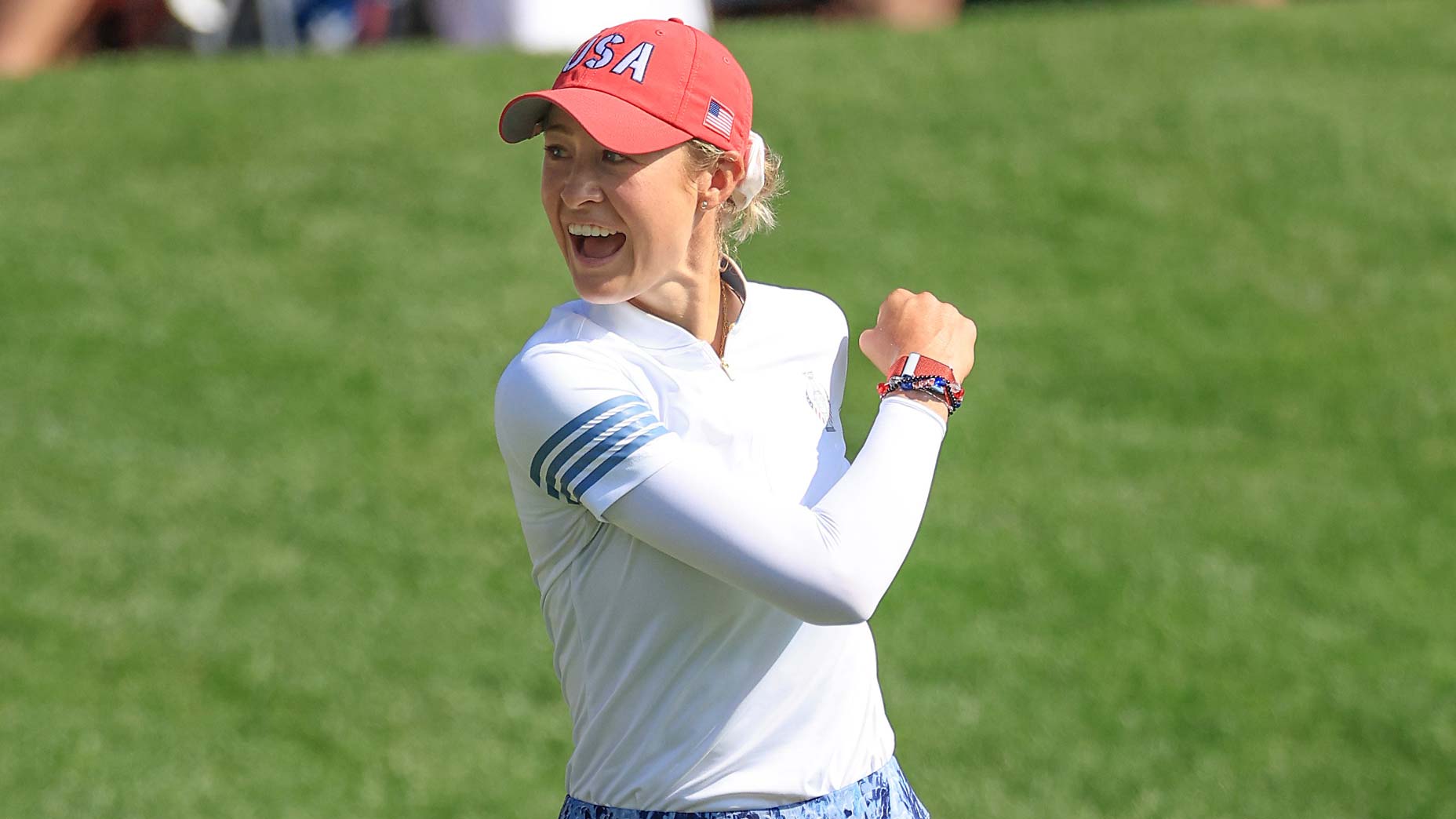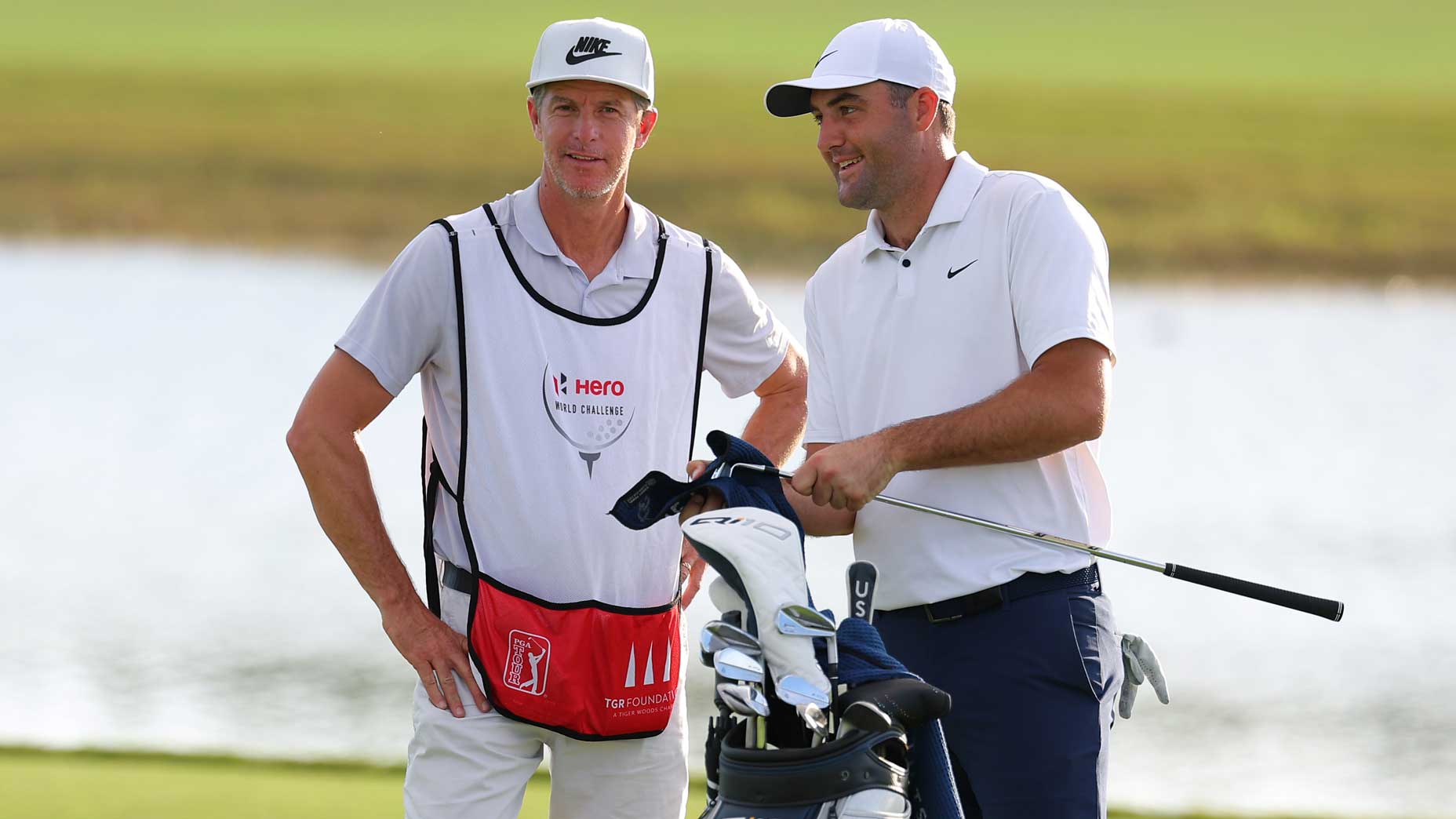In Nelly Korda and Scottie Scheffler’s dominant runs there are lessons for us all
- Share on Facebook
- Share on Twitter
- Share by Email
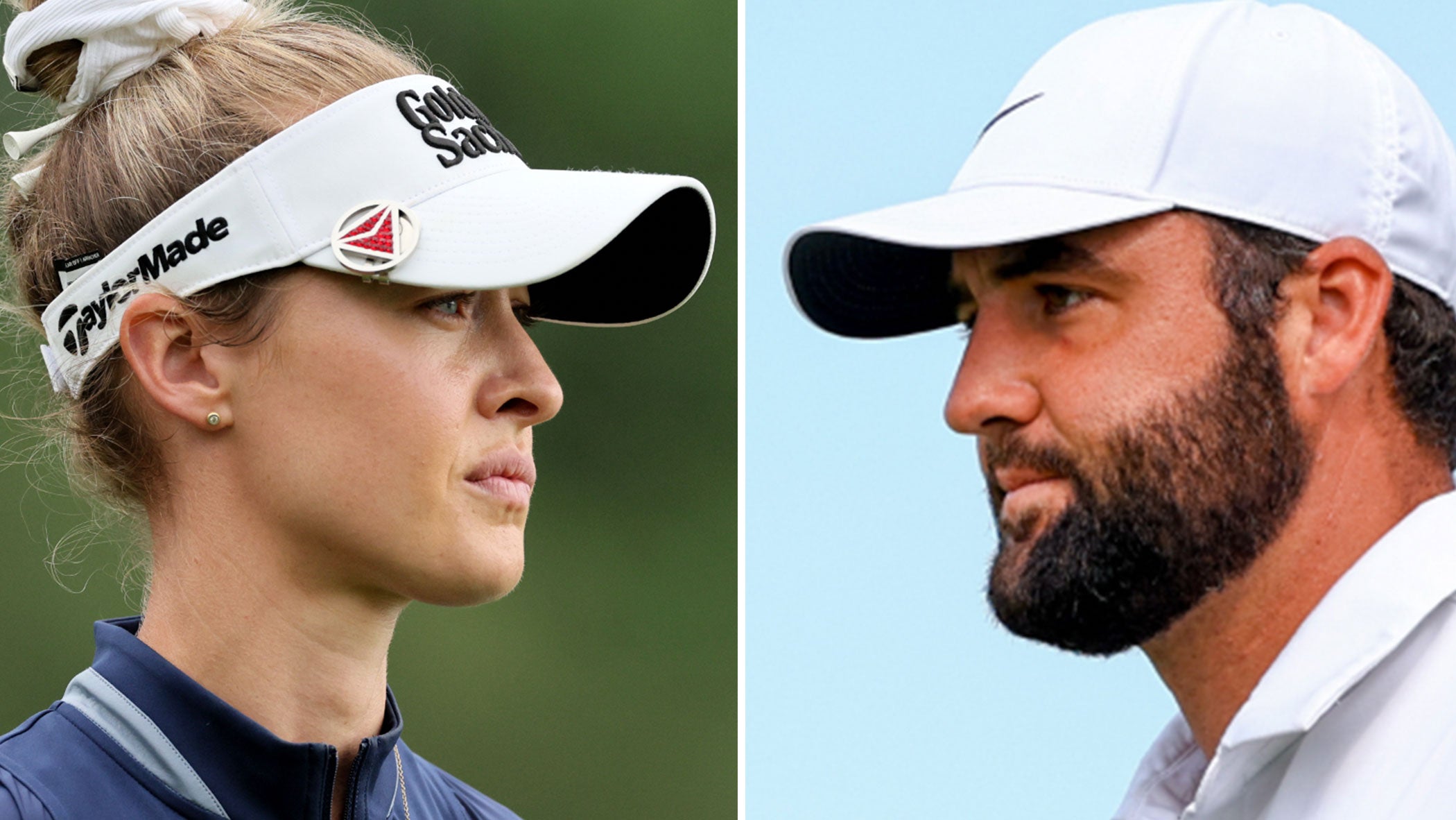
Nelly Korda and Scottie Scheffler have been lighting up the pro game.
getty images
With all due respect to Scottie Scheffler, who won the Tour’s old Hilton Head stop on Monday morning, eight days after he won his second Masters, and one month and four days after he won the Players Championship, this day belongs to Nelly Korda. Queen Nelly has now won five consecutive LPGA events. Top that, anybody, anywhere, on any tour!
On Sunday, she won the first major of the women’s golf season, the Chevron Championship, at a Jack Nicklaus course in suburban Houston, Carlton Woods, where things can go south on almost any hole at almost any time, between the ponds, the white stakes, the firm conditions, the high stakes. The Sunday leaderboard, loaded with talent, was bunched for a while. Korda was unflappable. She might have been flapping on the inside, but watching the solid NBC Sports coverage of it, you would never have known.
When your swing is the envy of the free world — when it is rhythmic and repeatable, with tried-and-true sequencing — unflappability can be your ultimate superpower. (Check out the Tiger highlights, circa 2000.) When you have all that, you can take you-do-you to the mountaintop. The actual competition part of it becomes less of an issue. Mickey Wright lived her golfing life that way. Wright’s wins were ultimately a tribute to her superior technique, her spectacular swing. That’s what we’re seeing in Nelly Korda. Her older sister, Jessica, now out of action with a back injury, has a similar approach.
This kind of mentality is not what you would instinctively expect from two golfers raised by two successful tennis players. Tennis is closer to boxing. In a match of equals, the over-the-net smackdown always lingers. Golf, at match play, often has that, and one of Korda’s five victories this year was at a match-play event. But it’s not baked into the DNA of all winners of all 72-hole stroke-play events. You could say that of Korda, and you could say that of Scheffler, too. A clear mind is a beautiful thing.
In golf — because its playing fields are so varied, because any single swing has so many moving parts, because the amount of time it takes to play is so long — it’s hard to keep it all going. Dark thoughts and bad luck are often lurking.
Nelly Korda never went to a dark place. She never had bad luck. And for the fifth time in her last five starts, at the end of the day, she had beaten everybody.
Let’s not even talk about when Nelly Korda will try for No. 6. Because this moment is extraordinary enough.
Here is the itty-bitty, teeny-tiny list of golfers who have won five straight LPGA events over the past half-century: Nancy Lopez, Annika Sorenstam, Nelly Korda. Lopez did it as a rookie. Sorenstam did it at the height of her career. Korda is already in her eighth season on tour, so she’s nothing like a rookie. But nobody can say where she is going from here.
Scottie Scheffler is 27. Nelly Korda is 25. Maybe they’ll be inducted into the World Golf Hall of Fame together. Maybe they will play in the mixed-team event, the Grant Thornton Invitational, at the end of this year. (A golf fan can dream.) Along those lines, maybe the LPGA and PGA Tour commissioners can figure out how to give golf fans what they want: more meaningful events, in more inventive formats. Along those lines, maybe golf’s blazer-at-lunch crowd can finally figure out that women’s golf, today especially, is utterly compelling. More storied venues would help.
Scottie Scheffler, Nelly Korda and the 1 key trait they shareBy: Zephyr Melton
Serious golf fans realize that what Nelly Korda has done this year is every bit as impressive as what Scottie Scheffler has done this year, if not more so. For one thing, there’s five versus four. Korda’s five: the Drive On event in Bradenton, Fla.; the Seri Pak event at Palos Verde Golf Club in Los Angeles; the Ford Championship near Phoenix; the Bank of Hope Match-Play at Shadow Creek in Las Vegas; and the Chevron. Scheffler’s four: Bay Hill, TPC Sawgrass, Augusta and Hilton Head.
Also, every time Nelly Korda plays, she faces the best golfers in the world, from all over the world. (Elite, global men’s golf is simply more spread out, and always has been.) Korda sees the likes of Lydia Ko and Brooke Henderson and Rose Zhang and a dozen or more golfers with similar profiles 20 or so times a year. Scottie Scheffler, in his PGA Tour life, cannot say that. It’s not his fault that he can’t, but he can’t.
Nelly Korda has made $2.4 million on the course so far this year. With his win at the RBC Heritage (that was worth $3.6 million), Scheffler has made more than $18 million this year.
Something is out of whack.
Especially when you consider that we all want to get better at golf, and there is not a golf instructor in the world who would teach Scheffler’s move, and there’s not a golf instructor in the world who would not teach Korda’s.
Sunday was a deserved gift to Korda and to women’s golf. For a while, there were likely a million people doing what we were doing, here in GOLF.com’s Philadelphia bureau. That is, finally figuring out how to use the last channel button on the TV remote. Back and forth, back and forth, from CBS (Hilton Head) to NBC (the Chevron). Until your correspondent finally realized that play at Hilton Head had been suspended (CBS was showing a tape, properly marked, of earlier play), because of the threat of lightening. The play in Houston was very much alive, and the lightning in Houston, where the woman played on the weekend in cool and breezy conditions that screamed this-is-serious, was supplied by the 14 clubs in Korda’s bag.
Every aspect of her play and demeanor was impressive, but this passing moment was as impressive as anything: Korda went for the pond-guarded green with her second shot on the par-5 18th hole on Sunday. She had close to 200 yards and an iron in hand, and the tournament was not over. But when it was her turn to play, Korda — on a Sunday when pace of play crawled — played her shot within 10 seconds. Why would you possibly want to wait around in that situation and let doubt creep in?
A lesson for us all.
“I can finally breathe now,” Korda said in a live NBC Sports interview when it was over. “I feel sick to my stomach.”
How Nelly Korda’s inner circle has helped power her historic runBy: Jack Hirsh
You never heard Mickey Wright say those exact words, but she must have felt something similar. Korda said them. Even after the final putt drops, it’s not like all that performance anxiety vanishes. Her words were an insight into how demanding it is, to do a difficult thing well, with the world watching. Maybe not the whole world, but your peer group, your family, the many people who know and admire what you’re trying to do.
Two years ago, after Scheffler won his first Masters, he said something similar, when he talked about his Sunday morning in his rental house in Augusta. He was with his wife, Meredith, crying like a baby, not sure if he was ready to do what he would be trying to do, win the Masters.
Sunday night, when his golf was done for the day but his tournament was not, Scheffler was aware of what Korda had done, at a course a thousand miles away.
“She finished I think T16 in her first event this year and the other five she’s won,” Scheffler said, getting it all correct. “I don’t know if I can quite relate to that.”
You don’t have to, Scott. What you’ve been doing is remarkable, special, amazing, impressive. And what Nelly Korda has done is remarkable, special, amazing, impressive. Good for them and good for golf.
“Golf can get overcomplicated,” Korda said in victory. “There’s a key, in the simplicity of it.”
Scheffler has his own copy of that key. And, yes, of course: It’s easy to keep it simple when you’re going like they’re both going. The complicated part is holding on to it. The complicated part is how the brain works, the demands of everyday life, the pressure that comes with playing 72-hole, stroke-play events with venerable trophies waiting for an engraver to update them.
Scheffler has the PGA Championship in May, the U.S. Open in June, the British Open in July. Korda has the U.S. Open in May, the PGA Championship in June, the British Open in August. There’s a lot of golf to be played, as spring turns into summer and golf gets more and more serious, for them and for us. This is outstanding, across the board.
Ms. Korda, we stand in awe. Five in a row. Five! We hope you’re breathing again. We are, but our pace is a little quick. We’re done, all of us, coming out of winter. We’re in the thick of it now.
Michael Bamberger welcomes your comments at Michael.Bamberger@Golf.com
Latest In News

Michael Bamberger
Golf.com Contributor
Michael Bamberger writes for GOLF Magazine and GOLF.com. Before that, he spent nearly 23 years as senior writer for Sports Illustrated. After college, he worked as a newspaper reporter, first for the (Martha’s) Vineyard Gazette, later for The Philadelphia Inquirer. He has written a variety of books about golf and other subjects, the most recent of which is The Second Life of Tiger Woods. His magazine work has been featured in multiple editions of The Best American Sports Writing. He holds a U.S. patent on The E-Club, a utility golf club. In 2016, he was given the Donald Ross Award by the American Society of Golf Course Architects, the organization’s highest honor.
